
Navigating Career Transitions: Self-Assessment, Upskilling, and Networking
If you've wondered what it would be like to quit your job and explore a new path this past year, you are in the majority.
In 2024 alone, 1.1 million people changed jobsduring the year ending February 2024, equating to a job mobility rate of 8% of all employed people changing jobs.
Whether or not you are pursuing a passion or side hustle, confused about quitting your job for a new one, or just looking for a change, know that it is not a straightforward decision. It requires careful planning and thinking.
Transitions aren't just about doing something different. A career transition is a lifestyle redesign that often entails rethinking how you want to feel at the end of the day, how you want to spend your time, and how this relates to your longer-term goals.
When you feel this need for change, it isn't necessarily related to a fancier title or more money, but your inner voice whispering that you could do more, be more, experience and achieve more.
As you navigate the career transition landscape, the roadmap should begin with a thorough self-assessment. If you are thinking about quitting your job to make a meaningful career transition, first consider the why, the want, and the when.
WHY (Do you want to change)
Sometimes, your desire for change can appear before you understand what you want to change. With honest self-reflection, you can determine the right changes for you. Do you want to change the company culture and the individuals you work with, or is there a deeper issue? It's crucial to be candid with yourself and meticulously consider your options.
Think specifically about what you like about your current position and the aspects you feel ready to leave behind. With this type of assessment, you can start to create a more exact picture of a better path for you:
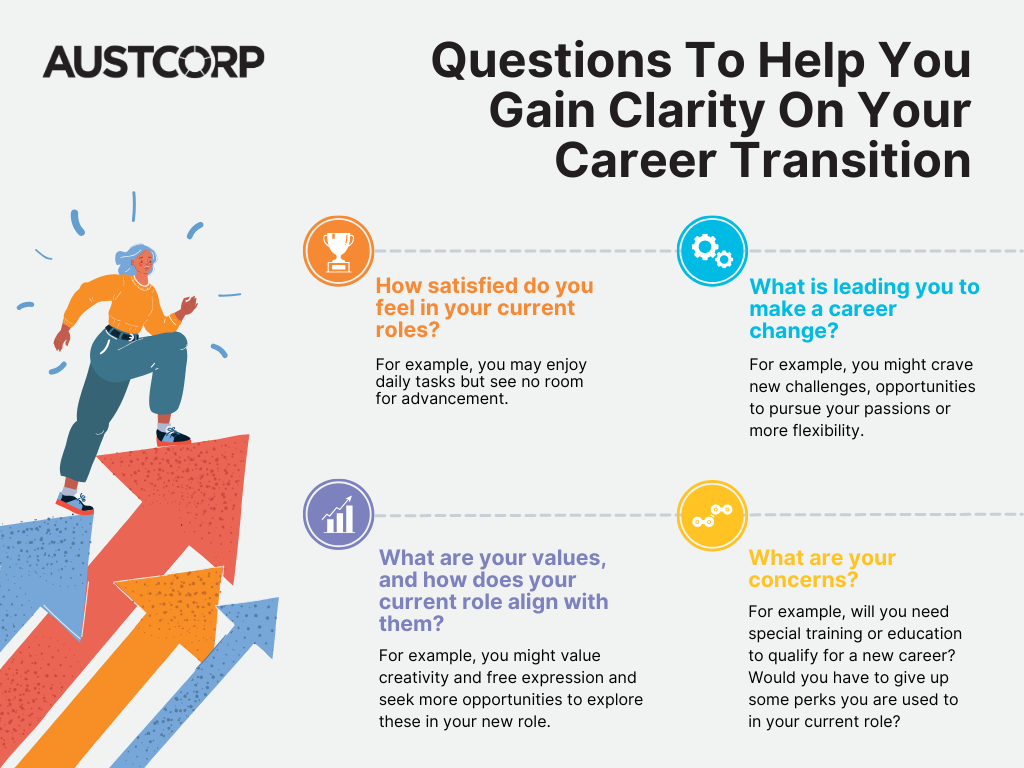
PRO TIP: Before resigning, try to experience what it might feel like in a new role. Is it an improvement over your current situation? Is transitioning worth it? Take a break from work to focus on a personal project that excites you. If you don't have such a project and are simply seeking something different, utilise your spare time to explore various industries or positions that intrigue you. This could involve volunteering, shadowing professionals in your fields of interest, or conducting informal interviews with individuals whose career paths you admire.
Always keep the final goal in mind. Long-term planning can be complex, but having a mental picture of the life you aspire to create can be beneficial.
PRO TIP: Pen down your future life story. Reflect on what defining moments would feature prominently in it. Be deliberate in detailing what legacy you wish to leave behind and how you intend to spend your time. In the end, how you utilise your time shapes who you become. This exercise can provide clarity on what truly matters to you and why. It doesn't need to be extremely lengthy; it just needs to offer insight into the journey you envision for yourself.
WHAT (do you want to do)
Evaluate your current situation. Some individuals may already know their desire to switch industries or return to school to acquire new skills, but many are still determining their future direction. Understanding your current position is essential before deciding where you want to go next.
Understanding what you'd like to experience in this next stage of your career can help you focus your efforts. Think broadly about the type of life you would like to live. Picture, step-by-step, what your perfect day would look like. What would you do? How would you feel? Where would you go? Who would you see?
Your professional life is part of your life. The values and goals that guide your daily movements are likely connected to your values and goals in other areas of life. Consider how your career can fit into or enable your desired life.
Here are some questions that can help you imagine a more optimal career scenario:
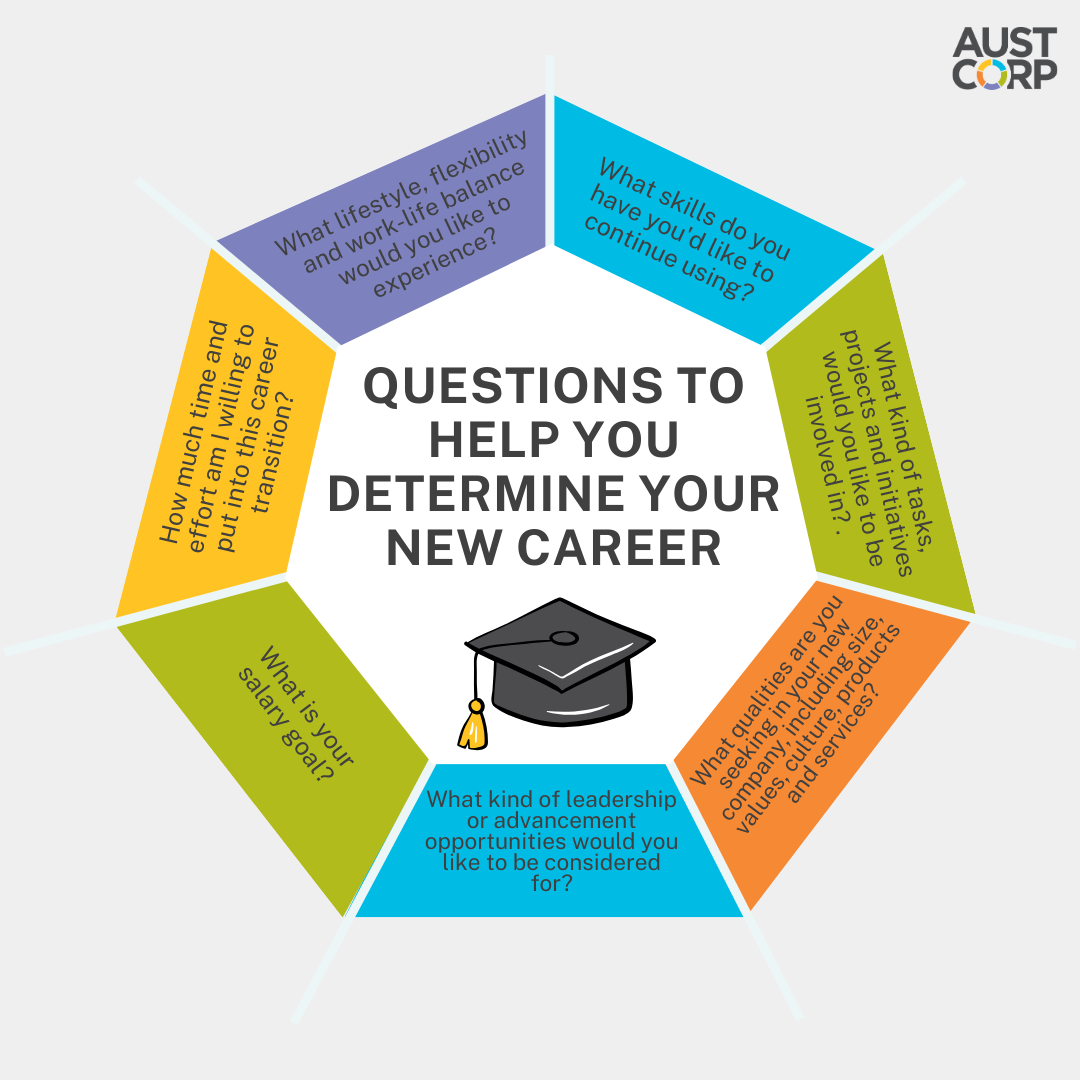
Research potential careers:
Next, begin researching careers that align with your goals. Create a checklist with your ideal career criteria to quickly compare potential career paths to your desired outcomes.
Start by scouring resources like Glassdoor and the AU Bureau of Labour Statistics to gather general information about new careers, such as average salary, projected job growth, typical educational background, etc. Identify two or three potential careers that match your professional interests and may contribute to your desired lifestyle.
WHEN (will the change happen)
Prepare for numerous rejections. Regrettably, career changes and recruitment procedures often hinge on prior work history. If you're a tech sales manager aiming to infiltrate the trading or hedge fund sphere, many will advise you towards a position akin to your current one despite possessing the skills for a sector switch.
Rarely do individuals gamble on someone with diverse experience. But once you find that single risk-taker, seize the opportunity to excel, persevere tirelessly, and demonstrate your worth.
Pro Tip: Fortunately, only some people need to gamble on you - just one is enough. Locating that individual/recruiter/hiring manager requires time. Anticipate several rejections before succeeding. Someone will eventually take that chance if your determination and readiness are robust enough.
Pro Tip: Stay realistic. Some transitions may be far-fetched in the short run. Avoid setting yourself up for disappointment with unattainable objectives within impractical deadlines. We tend to overstate our year-long capabilities and underestimate our decade-long potential. You can alter your industry, function, and location, but accomplishing all three instantly is unlikely. Gradual transitions are generally more enduring.
Pro Tip: Ensure a fallback plan. Develop an acceptable alternative when things don't proceed as anticipated or planned. It could be a midway point between your ultimate goal and present state. This could help bridge any skill or networking deficiencies during career transitions, and importantly, it sets you on your desired path.
Recognise your Transferable Skills
Throughout our extensive experience in the recruitment industry, we've observed that nearly every job seeker possesses valuable expertise. However, a common trend is that individuals often need to pay more attention to the transferable skills they've acquired. While embarking on a career change may seem daunting initially, it's crucial to remember that you're rarely starting from scratch.
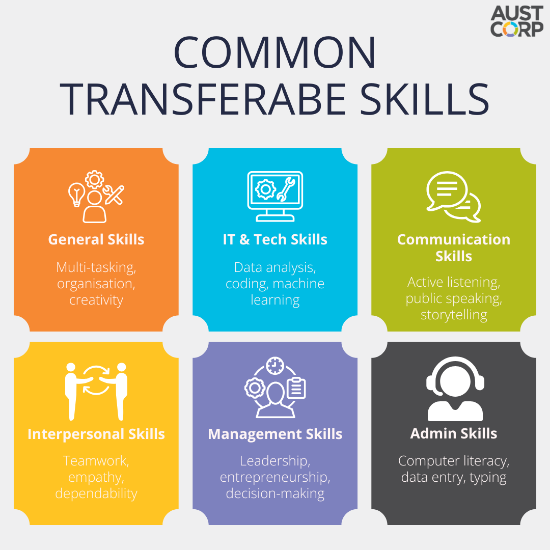
Begin by evaluating your qualifications for the new role. Examine two or three relevant job advertisements, paying close attention to the essential and desirable skills listed in the descriptions. Focus on identifying transferable skills—these are non-technical abilities that can be applied across various roles and industries.
Let's consider a case from our practice involving a Business Development Manager transitioning to a Marketing Specialist role. Initially, our client needed help to see how their business development experience could translate to marketing. However, we uncovered numerous shared competencies upon closer examination of both job profiles.
For example:
Both roles require strong communication skills to engage with clients and stakeholders
Data analysis and interpretation are crucial in both business development and marketing
Strategic planning is essential for both developing business opportunities and creating marketing campaigns
Both positions involve market research and understanding customer needs
We highlighted these transferable skills in the client's application and resume. It's vital to consider the importance of these non-technical abilities when presenting yourself to potential employers. They can be incredibly valuable differentiators.
During the hiring process, recruiters often encounter many candidates with similar technical qualifications. In such scenarios, soft skills like adaptability, creativity, or solid interpersonal abilities can be the deciding factors that set you apart from other applicants.
By recognising and effectively communicating your transferable skills, you can position yourself as a strong candidate, even when transitioning to a new field.
Developing Your Missing Skills:
After identifying the skills and experience required for your new role, it's time to set actionable goals to bridge gaps. The transition duration depends on various factors, including necessary education, skill acquisition time, potential relocation, and planned career breaks.
Let's consider the transition from a Business Development Manager to a Marketing Specialist. This shift might require enhancing your digital marketing skills, which can be achieved through various means.
We recommend breaking down your long-term plan into smaller, manageable benchmarks. Create a monthly roadmap outlining the steps to become a qualified candidate in your new field. Here's an example of how a Business Development Manager transitioning to a Marketing Specialist might structure their plan:
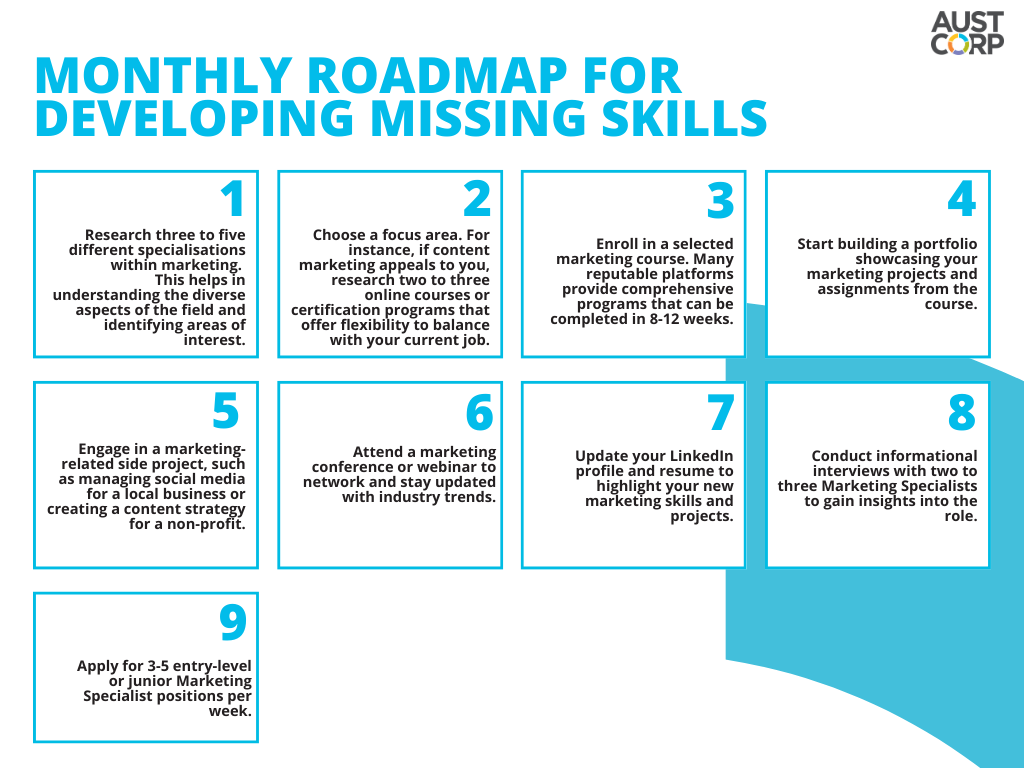
Remember, the timeline can be adjusted based on your circumstances and learning pace. The key is to maintain consistent progress towards transitioning into a marketing role.
Upskill in Gap Areas:
Now that you've crafted your plan, it's time to focus on acquiring the necessary skills - a process known as upskilling. The primary objective here is to develop or enhance the competencies crucial for your target role. To pinpoint these skills, revisit the job postings that caught your interest. Pay close attention to the required and preferred qualifications sections, identifying areas where your current skill set falls short.
Various online platforms offer tools to help you research skill requirements for specific roles. These resources can provide valuable insights into industry standards and expectations. Numerous websites offer free or low-cost courses covering various topics, allowing you to bolster your qualifications efficiently.
As you complete these courses, remember to update your resume accordingly. Create a dedicated "Certifications" section to showcase your newly acquired skills. Ensuring your resume accurately reflects all relevant competencies for your desired industry or position is crucial.
In some cases, pursuing formal education might be necessary, mainly if your target career significantly differs from your current field and demands in-depth knowledge or specialised training. While solid academic credentials sometimes outweigh practical experience, they can make you a more attractive candidate, particularly for entry-level positions. Employers may be more inclined to take a chance on a newcomer with a solid educational foundation in the relevant field.
Remember, the key to successful upskilling is to remain focused on your target role's specific requirements and continuously update your professional profile as you acquire new competencies.
Gaining Experience:
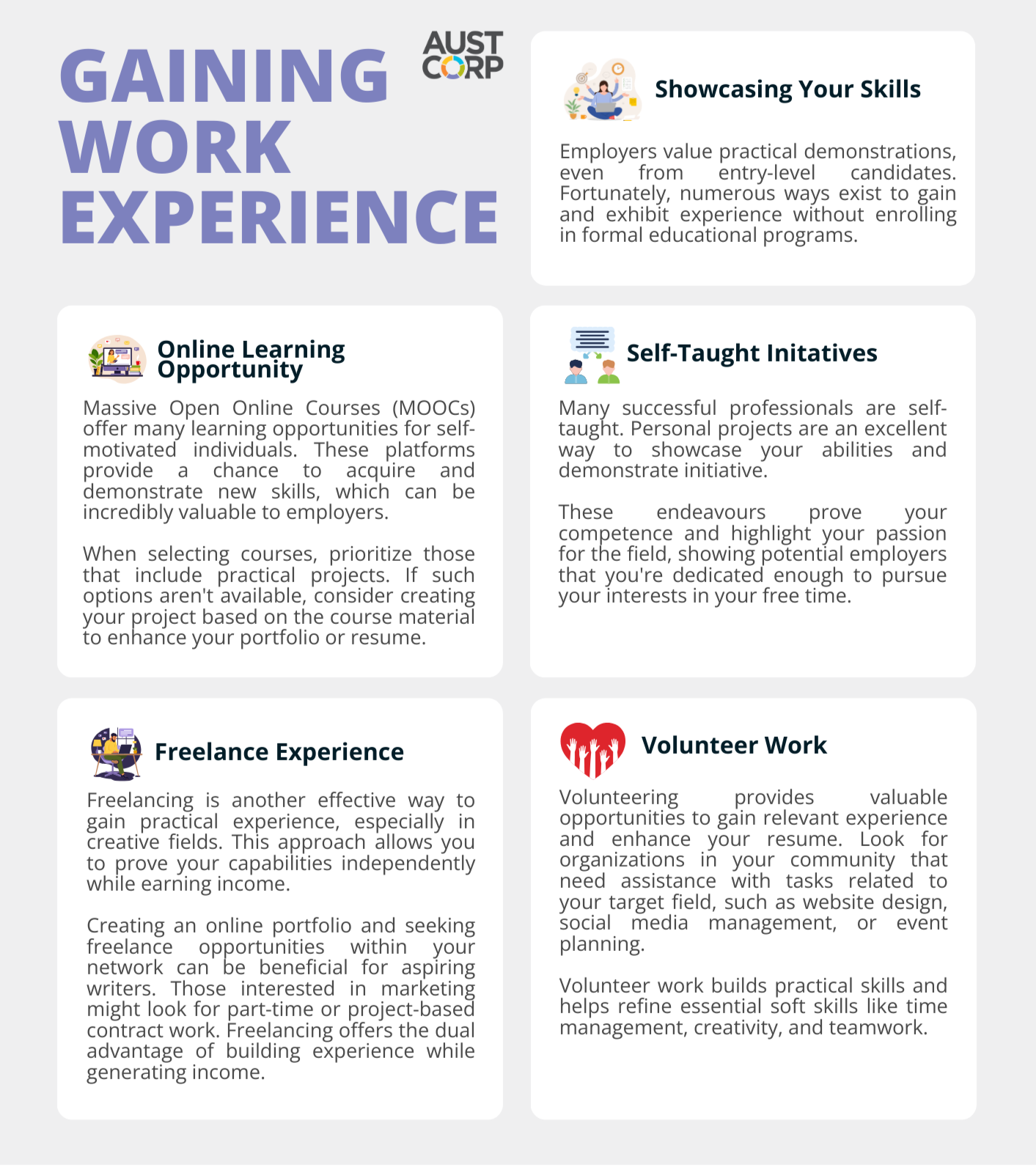
By engaging in these activities, you can build a compelling portfolio of experience demonstrating your skills and commitment to potential employers, even without formal work experience in the field.
Learn the Industry:
Familiarise yourself with the industry and its terminology to be knowledgeable before interviewing for a job. Read job descriptions, industry publications, and websites to learn vocabulary, equipment and job duties. Add common terms and keywords to your resume to show hiring managers you understand the field.
Leveraging Your Network for Career Transitions
Networking is crucial in any job search, regardless of your target industry. It's important to view networking as a long-term strategy. Begin by initiating conversations with individuals who can assist you in finding opportunities in your desired field. Consider these approaches to kickstart your networking efforts:
Tap into Your Existing Connections:
Examine your current network. Do you have friends or colleagues working in roles or companies that align with your career goals? Reach out to them and express your interest. Ask if they can inform you about relevant job openings or provide a referral when appropriate.
Engage in Informational Interviews:
An informational interview is an informal discussion with someone in your target role, industry, or company. These brief, typically 20–30-minute conversations offer valuable insights into the day-to-day experiences of professionals and the qualifications that helped them secure their positions. Additionally, these interviews provide an opportunity to gather expert advice on job search strategies and interview preparation for your field of interest.
While reaching out to strangers may feel uncomfortable initially, remember that not every interaction needs to result in a close relationship. The more informational interviews you conduct, the higher the likelihood of forming genuine connections that could lead to professional recommendations in the future. Approach these conversations with a friendly and appreciative attitude, focusing on learning about the career and establishing a rapport with your interviewees.
How to ask for an informational interview
When reaching out for an informational interview, being respectful, concise, and clear about your intentions is essential. Here's a sample template:
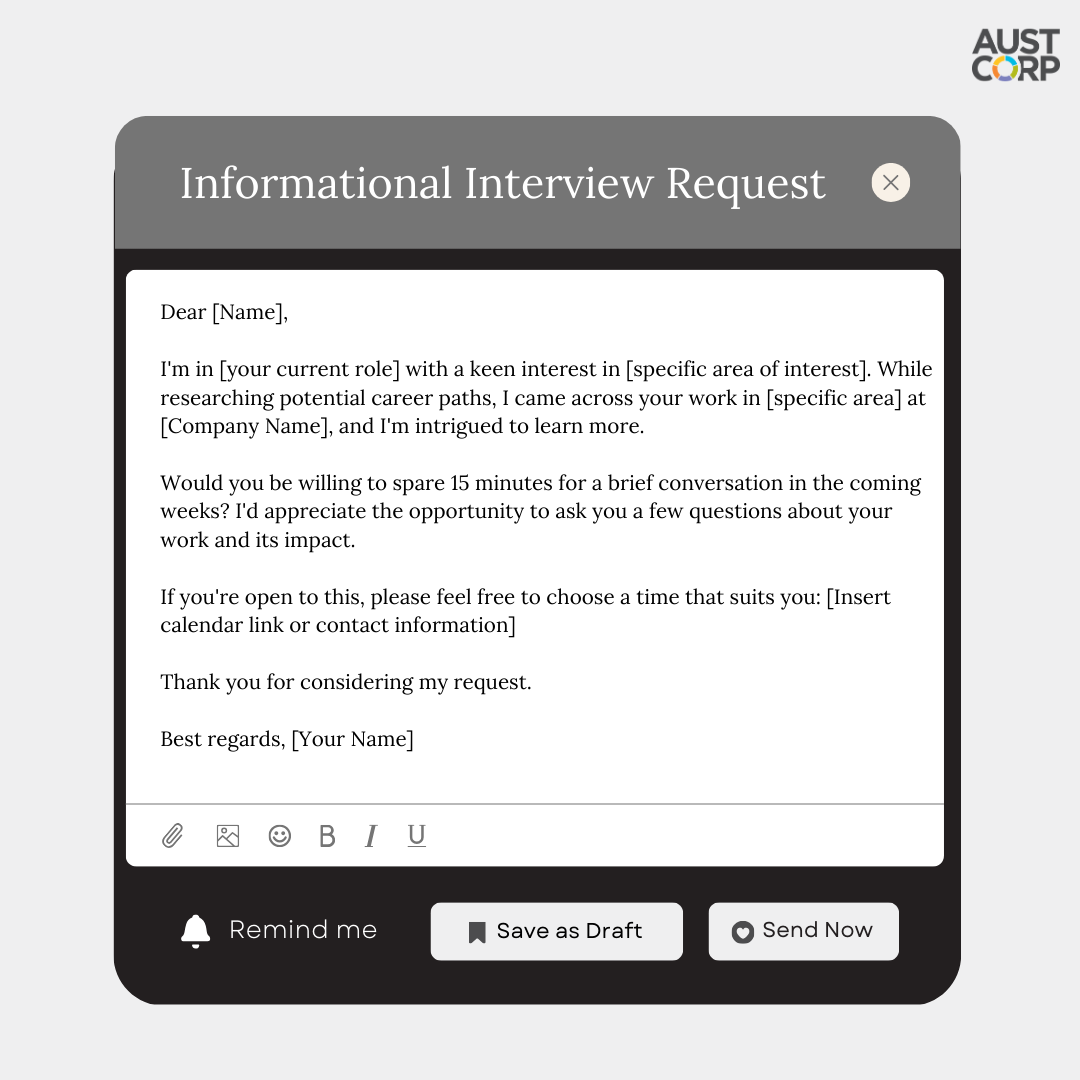
How to Make the Most of an Informational Interview
There's no "single best way" to conduct an informational interview, but you should remember that you are the interviewer, not the interviewee. Show up prepared and make the most of your time.
Some good questions to ask:
What excited you the most when you joined this company?
What excited you now? Anything you're less excited about?
What is the work atmosphere like on your team?
How would you rate the work/life balance?
What people excel on this team (or at this company)?
What skills does the company (or team) look for when hiring people?
Are there other people you might recommend I speak with to learn more?
May I stay in touch as I continue exploring possibilities?
After the interview is over, be sure to send an immediate thank you note and, if appropriate, extend an invitation to connect on LinkedIn.
Also, if you follow any advice the interviewee suggests (and have positive results), continuously loop back around and let them know what happened. Most people love knowing they've provided cheerful counsel, which gives you another opportunity to build rapport.
Read More: "A Guide To Strategic Networking: Maximising Your Professional Connections"
Tailoring Your Resume and Cover Letter for Career Transitions
When changing careers, it's crucial to adapt your CV (resume) to highlight your suitability for the new role. This often means shifting focus from your work experience, which may not directly relate to your new field, to your transferable skills, knowledge, and education. A well-crafted career change CV can significantly improve your interview chances.
Adopt a Combination Format
A combination format CV can be particularly effective for career changers. This approach blends elements of both functional and chronological resume styles, allowing you to showcase relevant transferable skills while still providing a clear work history.
The key advantages of this format include:
Highlighting transferable skills over direct experience
Addressing the challenge of limited experience in the new field
Drawing attention to skills developed across various aspects of your professional life
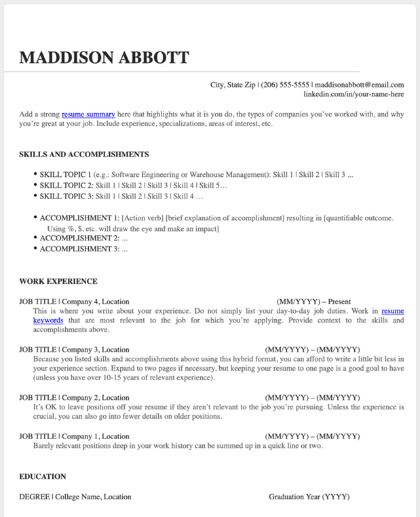
Suggested CV Structure
Consider organising your CV in the following order:
Contact Information
Professional Summary
Skills and Technical Abilities
Relevant Courses and Certifications
Work Experience
Education
Additional Relevant Sections (e.g., volunteer work, projects)
This structure allows you to prioritise your most relevant qualifications for the new role, regardless of where or how you acquired them. It will enable you to showcase skills developed through various experiences, including professional work, volunteering, education, and internships.
By tailoring your CV this way, you can present a compelling case for your suitability for the new role despite potentially needing more direct experience in the field. Remember to customise each application to align closely with the specific requirements of the position you're targeting.
Introduce A Summary In Your Resume:
When transitioning to a new career, your resume's professional summary becomes a crucial tool for capturing the attention of hiring managers. Positioned prominently below your contact information, this concise overview serves as your professional introduction, tailored to align with your new career aspirations.
The Importance of a Well-Crafted Summary
In today's competitive job market, recruiters often review numerous resumes quickly. A compelling summary that resonates with the job requirements can quickly position you as a promising candidate, even if your work history doesn't directly match the role.
Focusing on Transferable Skills
For career changers, the summary should highlight your most relevant transferable skills and qualifications that apply to the new position. To identify these:
Carefully analyse the job description
Note industry-specific keywords and phrases
Align your skills and experiences with these keywords
This approach helps human readers quickly assess your potential and ensures that Applicant Tracking Systems (ATS) recognise your resume as a good match for the position.
Example of an Effective Summary
Consider this example of a summary for someone transitioning from law to human resources:
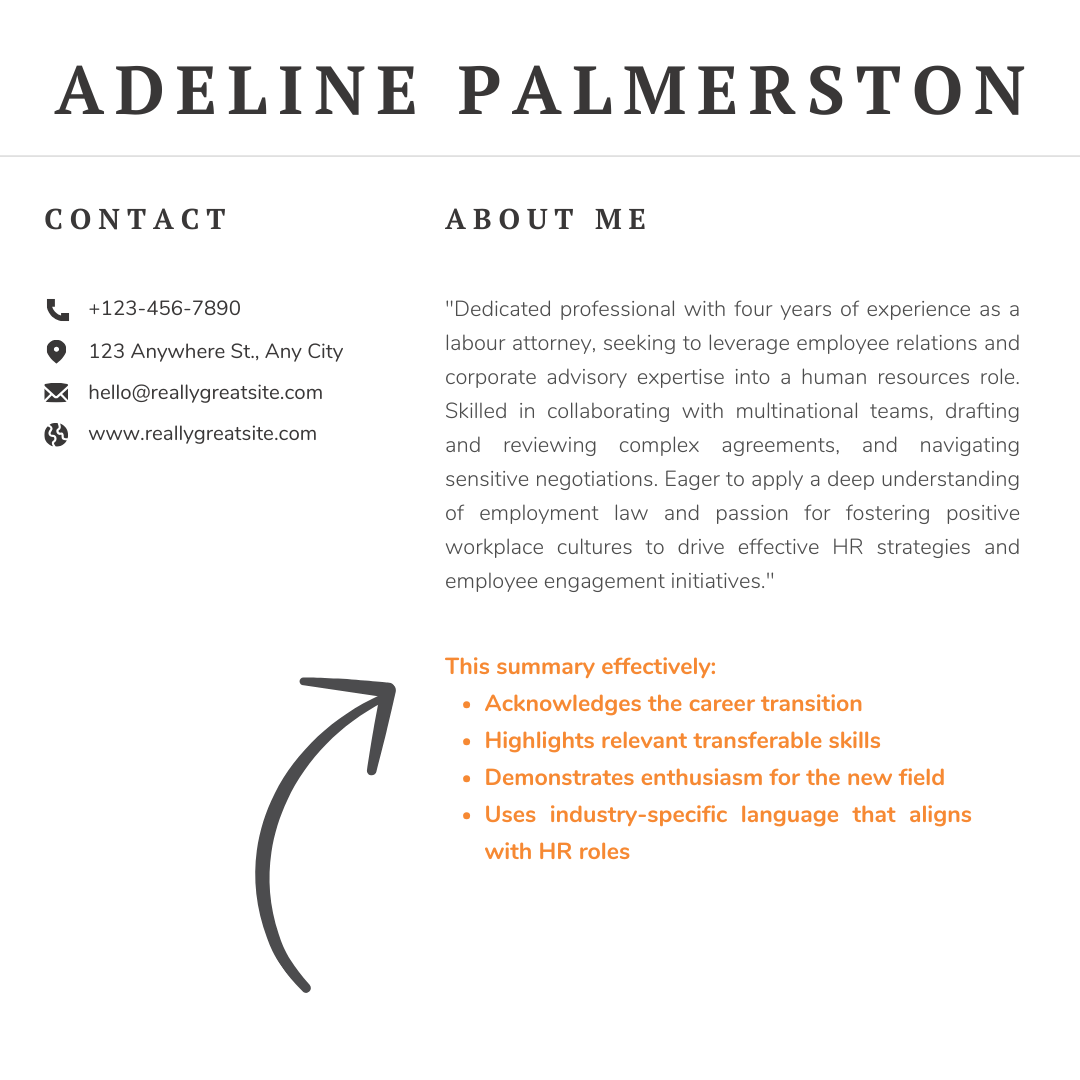
By crafting a targeted professional summary, you can effectively bridge your experience with your future career aspirations, making a compelling case for your potential in the new role.
Emphasise Skills Over Work History:
When changing careers, a chronological list of your work experience may not effectively showcase your suitability for the new role. Instead, consider restructuring your resume to highlight your relevant skills. Move your work history towards the end of the document and organize your experience under specific skill categories. For example, you might use headings like "Project Management," "Data Analysis," or "Client Relations" to emphasize your transferable abilities.
Under each skill category, list relevant experiences and achievements from various career stages, including volunteer work or personal projects. For instance, mentioning experience helping friends with budgeting could be appropriate if you transition into a financial role.
Highlight Applicable Degrees or Certifications For The New Job Role:
Prominently display any degrees, certifications, or ongoing coursework that aligns with your new career path. This demonstrates your commitment to the transition and proactive approach to acquiring the necessary skills.
Revise Your Professional Experience:
Adapt your work experience section to focus on transferable skills rather than job-specific duties. By emphasizing how your past roles have equipped you with skills valuable to the new position, you can make even seemingly unrelated experiences relevant. Remember to include pertinent volunteer work that aligns with your new career goals.
Include Relevant Projects
Include a section dedicated to professional or personal projects that demonstrate practical application of the skills required in your target role. These could be initiatives from previous jobs, coursework, or independent endeavours that showcase your capabilities in the new field.
Craft a Compelling Cover Letter
Use your cover letter to present a detailed case for your candidacy. Articulate your motivation for the career change, your long-term aspirations, and how this transition aligns with your goals. Explain the steps you're taking to prepare for the new role and why your unique combination of skills, dedication, and enthusiasm makes you an ideal candidate despite potential gaps in traditional experience.
By restructuring your resume and cover letter this way, you can effectively highlight your potential value in a new career, even without direct experience in the field.
Read More:"Resume Writing: A Step-by-Step Guide to Writing A Resume That Stands Out"
Addressing Your Career Change During Interviews
When transitioning to a new career, it's common for potential employers to inquire about your professional shift during the interview process. They aim to assess how your existing skills and experiences might benefit their organisation despite your lack of direct experience in the new field. Responding to these questions confidently can significantly enhance your appeal as a candidate.
Here are some strategies to effectively discuss your career change during interviews:
Discuss your Long-Term Goals
Begin by explaining how this career transition aligns with your broader professional aspirations. This approach demonstrates to potential employers that you've seriously considered your career trajectory. By articulating how the specific role or company fits into your long-term plans, you convey a commitment to growth within the organisation.
For example, you might say:
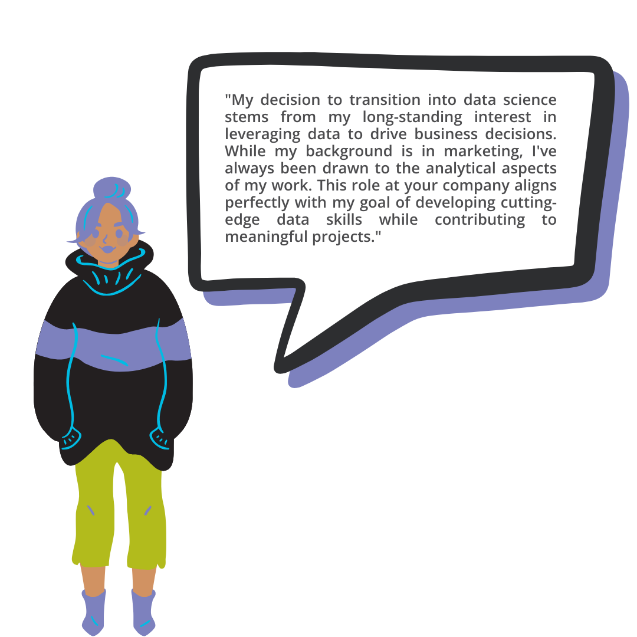
Addressing Your Career Change with Positivity and Honesty
When applying for a new role in a different field, it's crucial to have a transparent and authentic response to the question: "Why did you change careers?"
Your reasons could include:
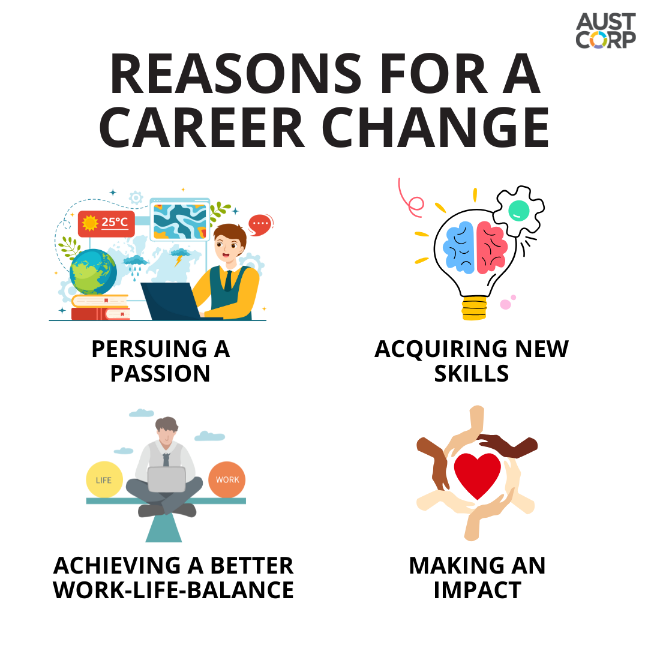
Whatever your motivations, they should align with your values, goals, and interests while maintaining a positive and constructive tone.
It's important to avoid criticising your previous employer, industry, or colleagues. Instead, focus on the positive aspects of your career transition. This approach demonstrates professionalism and a forward-thinking mindset.
Here are some examples of how to address career change questions honestly while emphasising the positives:
"While I enjoyed my time in finance, I've always been fascinated by environmental sustainability. This career shift allows me to combine my analytical skills with my passion for creating a greener future."
"My experience in customer service taught me the value of human connection. I'm excited to bring those interpersonal skills to the field of human resources, where I can have a more direct impact on employee well-being and organizational culture."
"After relocating to support my partner's career, I saw an opportunity to pursue my long-standing interest in data science. Your company's reputation for nurturing emerging talent in this field made it the perfect place to start this new chapter in my career."
By framing your career change in a positive light and connecting it to your personal growth and aspirations, you demonstrate self-awareness and a proactive approach to your professional development. This perspective can appeal to potential employers, as it showcases your adaptability and commitment to continuous learning.
Highlight Your Distinct Value
Your diverse background can be a significant asset when changing careers. During interviews, emphasise how your previous experiences give you a unique viewpoint in your new field. For instance, a former chef transitioning into project management could explain how their expertise in high-pressure kitchen environments has honed their ability to manage multiple tasks simultaneously and meet strict deadlines.
Showcase Transferable Skills
One of the primary challenges in career transitions is demonstrating relevant skills for the new role. Focus on identifying and highlighting your transferable skills - valuable abilities across various industries and positions. These might include:
Critical thinking
Adaptability
Time management
Conflict resolution
Provide specific examples of how you've applied these skills in your previous roles. For instance, if you're transitioning from teaching to corporate training, you might discuss how you developed and implemented curriculum plans, adapting them to diverse learning styles - skills directly applicable to creating effective corporate training programs.
Emphasise New Qualifications
Highlight any new skills or qualifications you've acquired during your career transition. This could include:
Relevant certifications
Completed courses
Personal projects
Volunteer work in the new field
For example, if you're moving from accounting to data analysis, you might discuss a data visualisation course you completed and a personal project where you analysed local housing market trends.
Demonstrate Achievements Using the STAR Method
Use the STAR (Situation, Task, Action, Result) method to provide examples of concrete accomplishments. This approach helps you structure your responses and clearly illustrate how you've applied your skills to solve problems.
Example: "In my previous role as a marketing coordinator, I noticed our social media engagement was declining (Situation). I was tasked with improving our online presence (Task). I developed a content calendar and implemented a strategy for user-generated content (Action). As a result, we saw a 50% increase in engagement and a 20% growth in followers over three months (Result)."
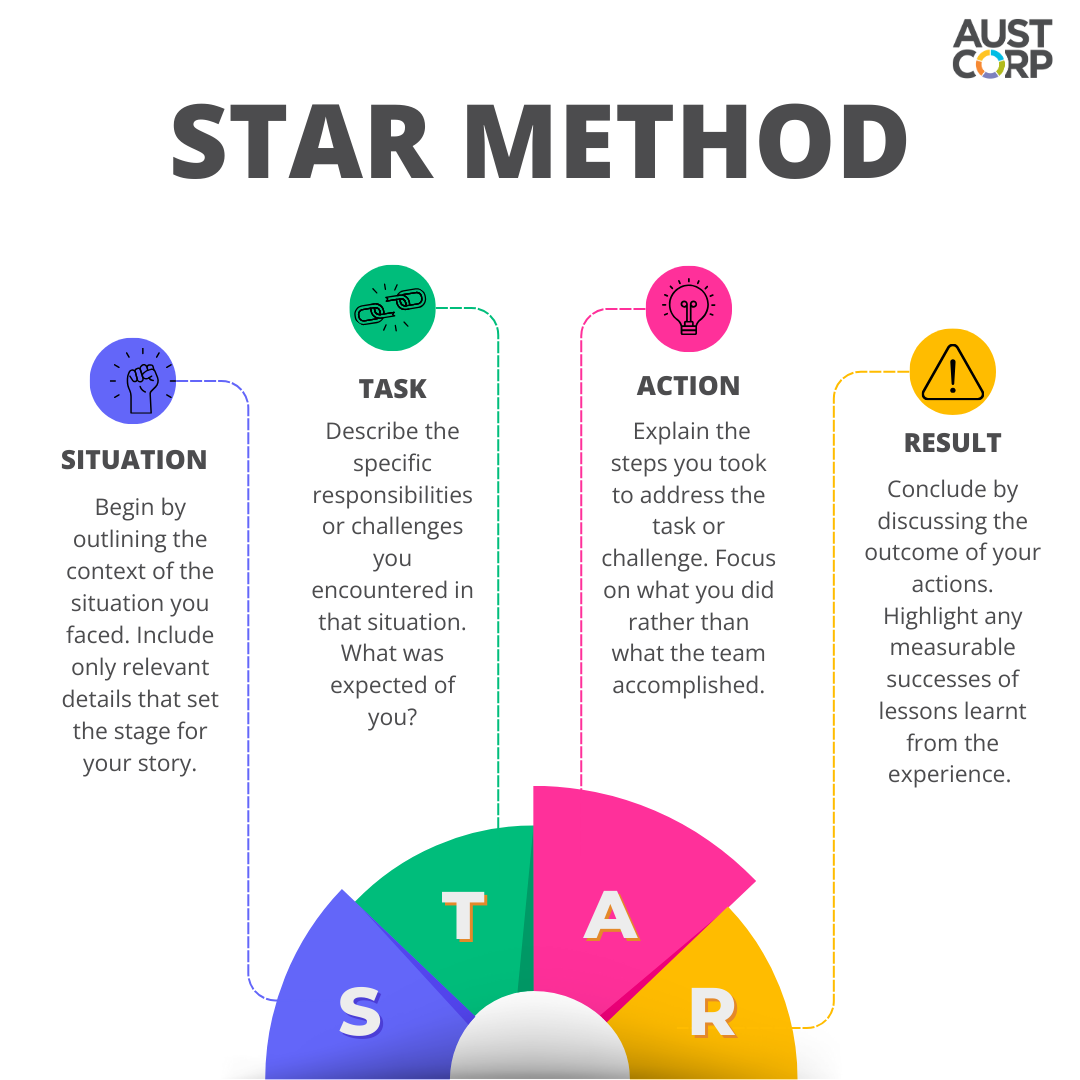
Research the Company
Preparing for an interview involves several crucial steps, and one of the most significant is understanding the company you're applying to. This goes beyond simply impressing your interviewer with your knowledge; it reflects your genuine interest in the organisation and its mission.
Familiarising yourself with the company's history, values, culture, and recent achievements indicates that you are not just seeking any job but are eager to contribute to their specific team. The more informed you are about the company, the better equipped you will be to provide relevant answers during the interview. You can align your skills with the job requirements and connect your values with the organisation's.
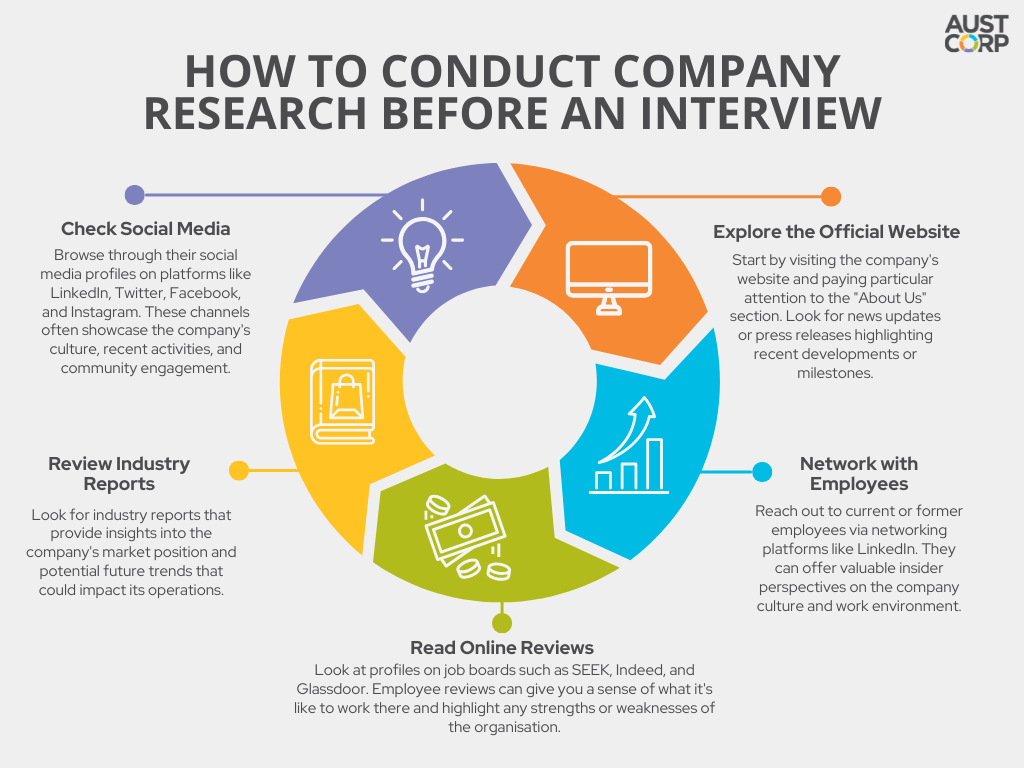
Once you have a grasp of the basics, delve deeper into specific aspects of the company:
Company Culture and Values: Understanding these elements will help you assess how well you would fit within their environment. Look for information regarding their stance on work-life balance, collaboration among teams, and employee engagement initiatives.
Recent Projects and Achievements: Familiarity with notable projects or accomplishments can provide you with relevant talking points during your interview and show your enthusiasm for their work.
Leadership and Management Style: Researching key organisational leaders can give you insights into their strategic vision and how they prioritise employee welfare.
Bring tangible evidence
Providing tangible evidence of your transferable skills can significantly strengthen your case when transitioning careers. Consider bringing:
A digital or physical portfolio showcasing relevant projects
Samples of work that demonstrate applicable skills
Testimonials or recommendations from previous collaborators or clients
Creating an online portfolio or professional website can be particularly beneficial, allowing employers to review your work conveniently.
Example: A teacher transitioning to instructional design might present lesson plans, educational materials they've created, or student feedback demonstrating their ability to convey complex information effectively.
Interview Techniques for Career Changers
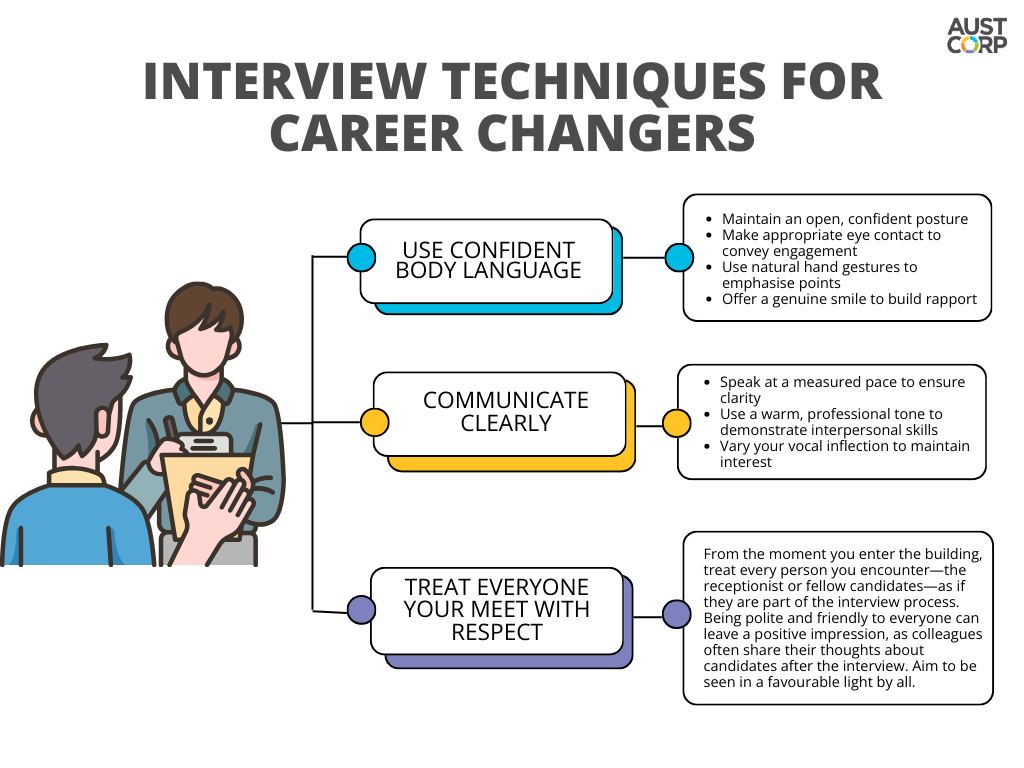
By presenting concrete evidence of your capabilities and employing these interview techniques, you can effectively communicate your value as a career changer and demonstrate your readiness for the new role.
Read More:
- Job Interview Preparation Made Easy: Step-by-Step Guide for Candidates
Recognising and Managing Emotions During a Career Transition
Career transitions are not just about practical steps; they involve a complex emotional journey that can significantly impact your decision-making process and overall experience. Understanding and effectively managing these emotions is crucial for a successful transition.
Dealing with Guilt
One of the most common emotional hurdles in career transitions is guilt. This feeling can stem from the following:
Leaving colleagues and mentors who have supported you
Departing from a company that has invested in your development
Breaking connections with long-term clients or customers
It's important to remember that career decisions are ultimately personal choices. While it's natural to feel a sense of loyalty, these feelings should not hinder your professional growth. Consider the following strategies to manage guilt:
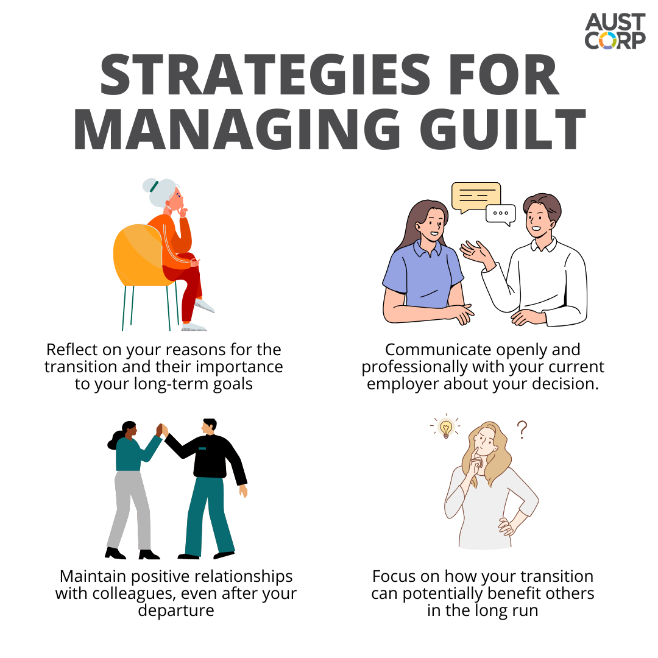
Fear of Unknown and Self-Doubt
Venturing beyond your comfort zone often stirs up anxiety. Feeling apprehensive when leaving behind what is familiar and embracing new experiences is natural. This fear of the unknown can lead to self-doubt, where you may question your capabilities and worry about the uncertainties that lie ahead.
Starting a new career path means entering unfamiliar terrain, which can feel destabilising. The uncertainty of the future can challenge your sense of security and control, making the transition seem daunting.
Conquering self-doubt and imposter syndrome is crucial for a successful career change. Here are some strategies to help manage these feelings:
Acknowledge Your Thoughts: Begin by recognising when you experience self-doubt. Listen to your internal dialogue and note negative thoughts about your abilities. Awareness of these patterns is the first step toward changing them. Tools like journaling apps (such as Day One and Penzu), cognitive behavioural therapy (CBT) apps (MoodGYM) or thought recording apps like (Thought Diary) can help you track and analyse your thoughts.
Challenge Negative Beliefs: Once you've identified self-doubting thoughts, challenge them by questioning their validity. Ask yourself if there's concrete evidence supporting these beliefs. Often, self-doubt stems from irrational fears rather than facts. Counter these thoughts by recalling past achievements and demonstrating your capabilities. Online CBT exercises and worksheets OR OTHER can be beneficial here, as they provide structured ways to dispute your irrational beliefs.
By addressing these feelings head-on and using practical tools to manage them, you can build confidence and resilience as you navigate the challenges of a career transition.
Adjusting Your Identity And Sense Of Self:
Career changes often necessitate a shift in how we perceive ourselves. According to Gallup research, 55% of people in Australia define themselves by their jobs instead of considering work as simply what they do for a living. If your job or career changes, you will likely need to adjust your self-image, too.
Transitioning from a familiar career path can trigger a range of complex emotions, including:
Grief over leaving behind a known environment
Anxiety about the unknown future
Uncertainty about one's professional identity
Nostalgia for past achievements and relationships
Research in vocational psychology confirms that career transitions can elicit responses similar to grief, underscoring the importance of addressing these emotions proactively.
You might grieve the loss of professional relationships, the routine and structure you were accustomed to, and the sense of competence and expertise you had built over the years. This transition can feel like losing a part of yourself, leading to an identity crisis where you question your place and purpose in the professional world.
Here are some practical strategies to help you manage grief and identity loss during a career transition:
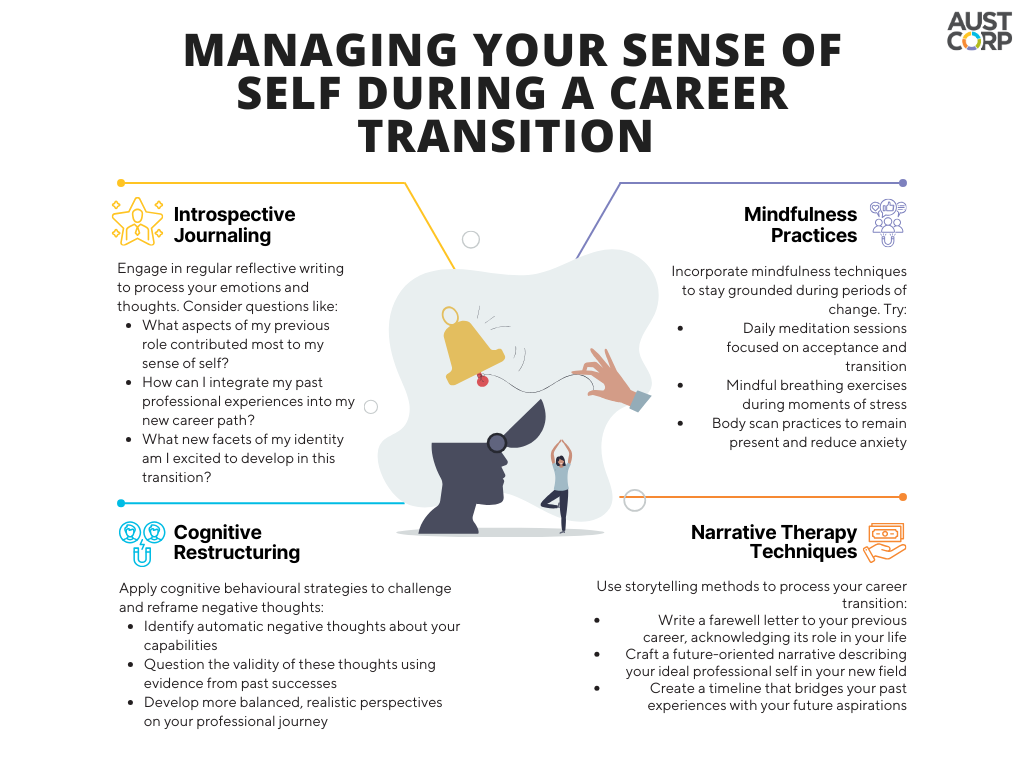
By implementing these strategies, you can more effectively manage the psychological challenges of career transitions, fostering a flexible and resilient professional identity that adapts to new opportunities and challenges.
Financial Concerns and Managing Risk:
Career changes often come with significant financial implications. These include temporary income reductions, relocation expenses, additional training costs, and other unforeseen financial challenges. Addressing these concerns through careful planning can alleviate stress and provide a more straightforward path forward.
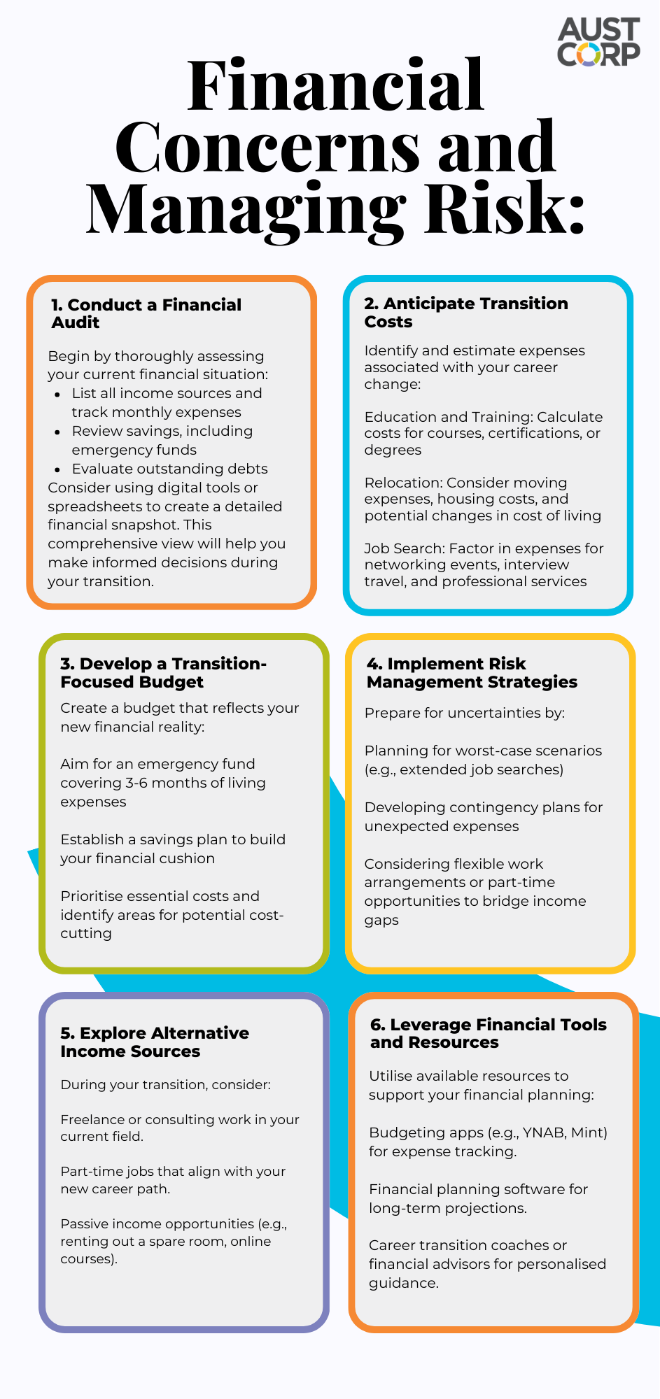
By taking a proactive and comprehensive approach to financial planning, you can navigate the financial challenges of a career transition more effectively. Flexibility and adaptability are critical as you work towards your new career goals while maintaining financial stability.
Facing Challenges and Setbacks:
Career changes are rarely smooth sailing. Obstacles and setbacks are not just possible – they're integral to the journey. You might struggle to adapt to a new work environment, grapple with unfamiliar skills, or face rejections during job searches. While these challenges can be disheartening, recognising them as natural parts of the transition process can help you approach them with a more resilient mindset. Here are some strategies for building resilience.
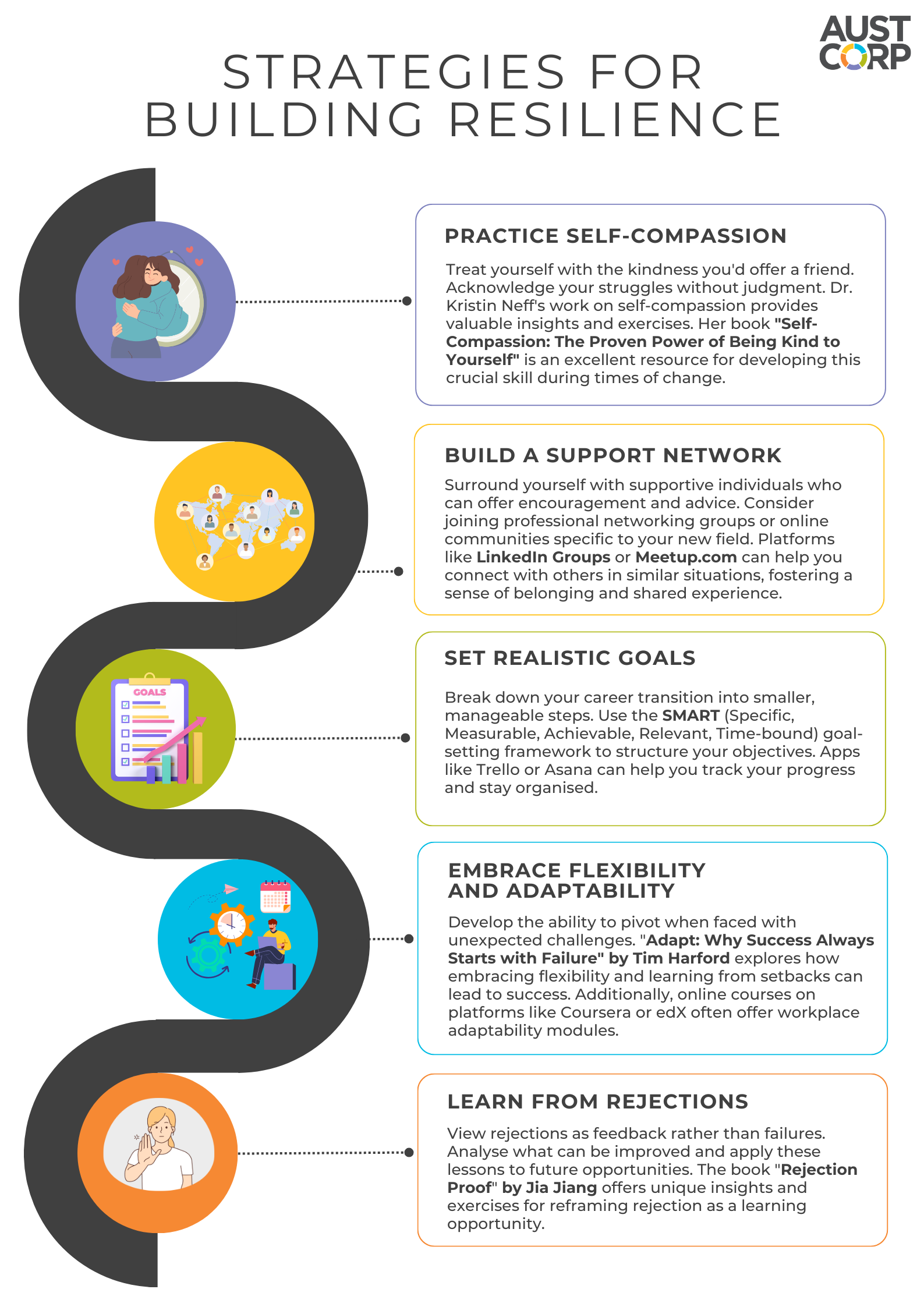
Remember, resilience is a skill that can be developed over time. By implementing these strategies and utilising the suggested resources, you can build your capacity to bounce back from setbacks and navigate your career transition more effectively.
Resources:
"Self Compassion: The Proven Power of Being Kind to Yourself" by Kristin Neff
"Adapt: Why Success Always Starts With Failure" by Tim Harford
Embracing a Growth Mindset
The concept of a growth mindset, popularized by psychologist Carol Dweck, can be a powerful tool in navigating career transitions. This mindset is based on the belief that abilities and intelligence can be developed through effort, learning, and persistence. Adopting this perspective can significantly impact approaching challenges during your career change.
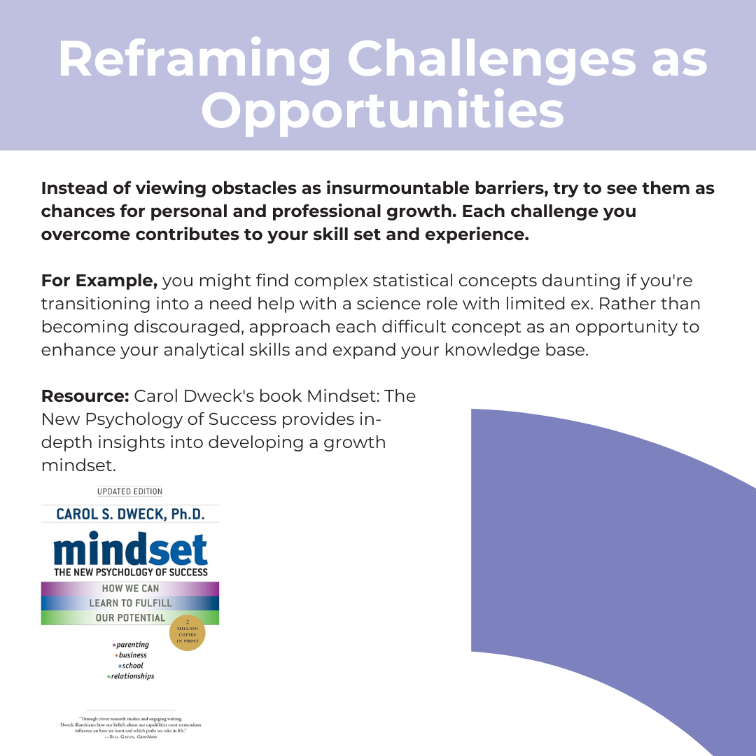
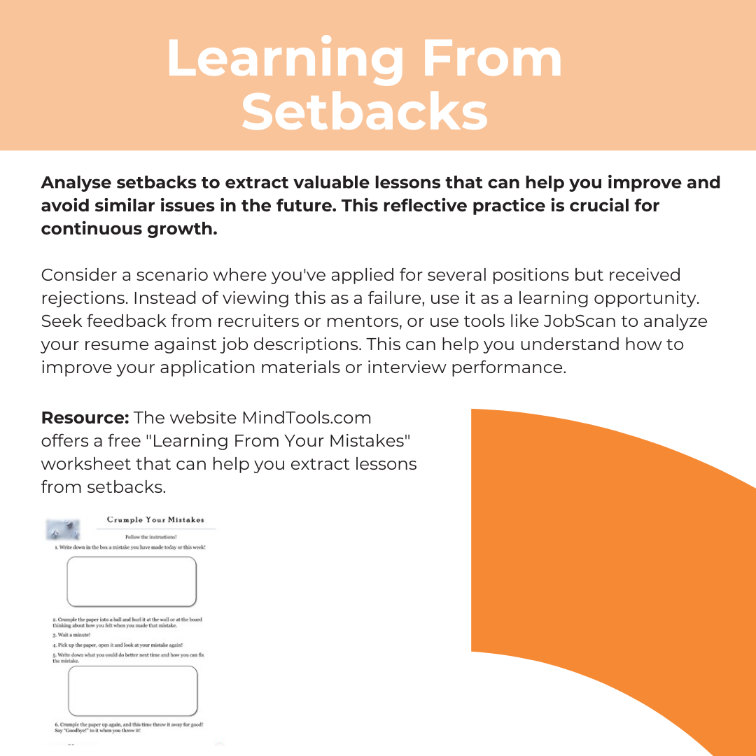
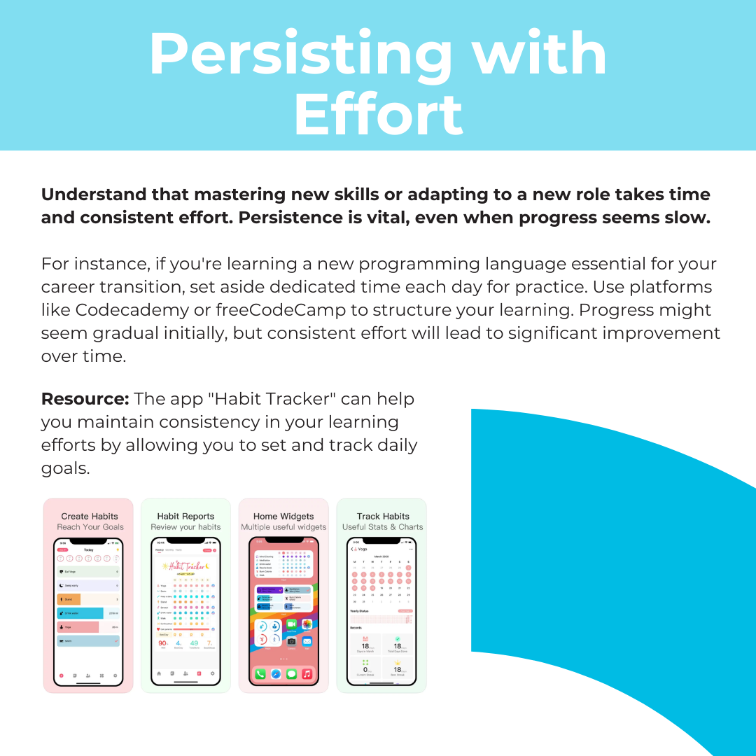
Cultivating a Growth Mindset
To further develop your growth mindset:
Practice positive self-talk: Replace phrases like "I can't do this" with "I can't do this yet." The Happify app offers exercises to improve positive thinking.
Seek feedback: Regularly ask for constructive criticism from mentors or colleagues. Kim Scott's Radical Candor framework provides guidance on giving and receiving effective feedback.
Celebrate small wins: Acknowledge your progress, no matter how small. The app "iDoneThis" helps you track and celebrate daily accomplishments.
Embrace continuous learning: Adopt a lifelong learning approach. Platforms like Coursera and edX offer various courses to support your ongoing development.
Remember, developing a growth mindset is itself a journey. Be patient with yourself and celebrate the progress you make along the way. With persistence and the right attitude, you can navigate your career transition more effectively and emerge stronger from your challenges.
Conclusion
If you aren't thinking about a career transition today, someday you will. As and when that day comes, approach it with curiosity, conviction, and commitment. Career transitions are messy, but they can also be catalysts in shaping a future self you will be proud of. There is no way of guaranteeing success, but trying might leave you with regrets.
Always remember, a career transition isn't just about leaving one job for another. It's about exploring new opportunities, learning and growing, and ultimately finding fulfilment in your work. So, embrace the uncertainty, trust your abilities, and take that leap of faith when the time is right. It might be the best decision you ever make.
Take the Next Step in Your Career Journey
Are you struggling to stand out in today's competitive job market? Looking for your dream job? Don't let it slip away. Contact us today for a confidential conversation with one of our recruitment consultants who can help elevate your job search and resume-building efforts.
Why connect with our recruiters?
Direct access to hiring managers and companies
Potential to bypass initial screening stages
Increased chances of securing interviews
Personalised guidance to help you stand out
Don't leave your career to chance. Let our expertise work for you. Reach out now and take the first step towards your ideal role!
Read More Career Tips and Guides
Hungry for more career advice? Check out these relevant blogs to further enhance your professional journey:
